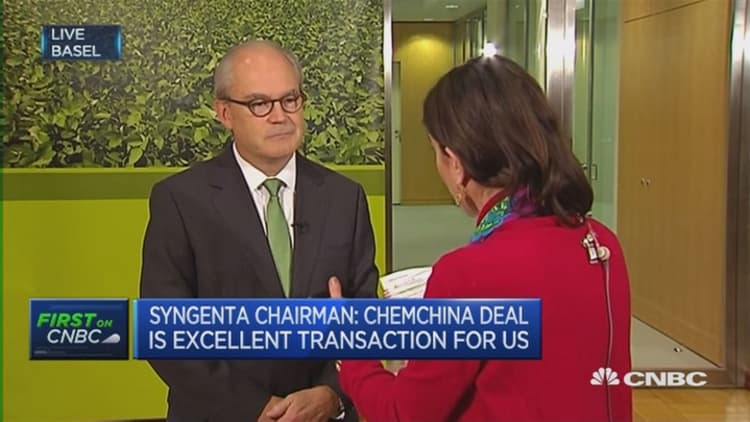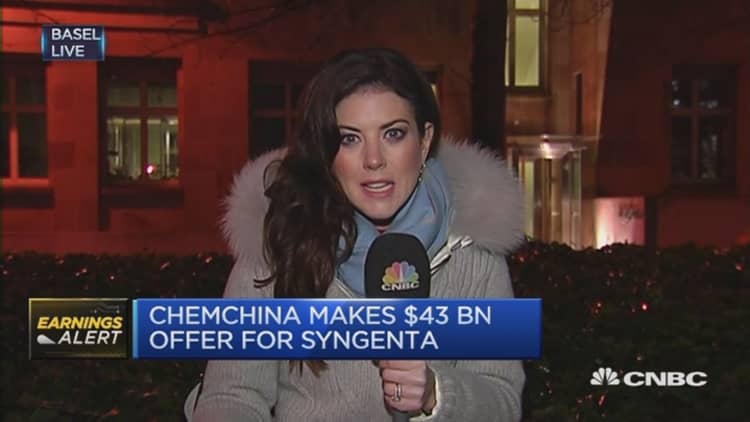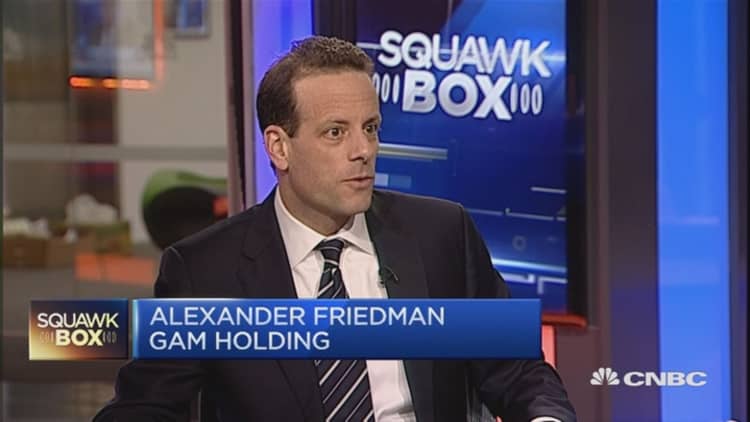


The takeover of Syngenta by ChemChina does not amount to a Chinese nationalization of the Swiss agrichemicals giant, the company's chairman told CNBC.
Earlier on Wednesday, the Swiss agricultural chemicals giant Syngenta said it was to be acquired by ChemChina. Syngenta said the deal, worth over $43 billion, is equivalent to 480 Swiss francs ($471.38) per share. The deal marks the largest ever attempted overseas acquisition by a Chinese firm, Reuters reported.
The deal has raised eyebrows over what could lie in store for Syngenta, which employs over 28,000 in some 90 countries. Its chairman insisted it would be business as usual at the firm, however.
"This is absolutely not a China nationalization," Michel Demaré, chairman of Syngenta, told CNBC on Wednesday after the deal was announced. It will see the chairman of ChemChina head Syngenta's board of directors. Syngenta said its existing management will continue to run the company, however.
"ChemChina has a fantastic track record of having not only bought companies outside of China but also having kept investing in them and developing them and keeping the culture and values in place and I'm absolutely convinced that the same will happen here," he said, speaking to CNBC in Basel where Syngenta is headquartered.
There had been speculation that the deal could be announced on Wednesday after months of protracted negotiations. Syngenta had been under pressure to offer rewards to shareholders after turning down a big offer from U.S. rival Monsanto in 2015.
Demaré said Wednesday's deal was a "fantastic transaction" for Syngenta and one that would satisfy all the company's stakeholders.
"It's great value for current shareholders and…it's a very nice premium for shareholders."
"In addition, we also have to look at all the stakeholders - the employees, the customers - and I think the main message here is that it's not a transaction about cost synergy, it's a transaction about growth, about innovation, about long-term vision and Syngenta will continue like it is today," he said. He insisted that "Syngenta remains Syngenta but with a long-term investor that will allow us to continue deploying our a standalone strategy for the years to come."
Demaré did not believe the transaction would pose a problem for anti-trust regulators despite its size.
On Wednesday, Syngenta reported full year earnings marred by what it said were low crop prices, emerging market instability and "massive" movements in currencies. It reported a full-year net profit of $1.3 billion, down 17 percent on the year before.
It said 2015 sales totaled $13.4 billion, down 11 percent in actual exchange rates due to U.S. dollar strength from the previous year. In constant currency terms, sales were up 1 percent.
Its earnings before interest, tax,depreciation and amortization (EBITDA) fell 5 percent to $2.7 billion, down from $2.93 billion in the previous year.
Demaré rebuffed the notion that seed-maker Syngenta was selling out of weakness.
"The industry is obviously in very challenging conditions, commodity prices are down, we're affected a bit more because of our penetration into emerging markets, and still despite that we have managed to improve our EBITDA margin by 140 basis points," he said.
"So I think that Syngenta is actually showing a lot of resilience and good shape and we feel that as long as markets recover and emerging markets stabilize...the long-term future is bright. This is an industry where the long-term drivers are still intact, people will still need to be fed, the population keeps increasing so I think the future is very bright for the company."
In the earnings release, Syngenta said it had done its best to navigate various headwinds in 2015, the most notable being exchange rates which have seen multiple currencies lose value against the strengthening dollar.
"Our ability to navigate our way through these headwinds was notably evident in 2015, when exchange rates reduced our full year sales by $1.8 billion – and yet the impact on EBITDA was contained at just $100 million."
It added that the latest currency challenge has been the rapid devaluation of the Brazilian real, which accelerated during the summer just as the planting season was getting underway.
"Our focus has been on supporting our customers through this period of economic difficulty, while safeguarding our balance sheet through rigorous risk management," it added.
Follow us on Twitter @CNBCWorld and Facebook.


